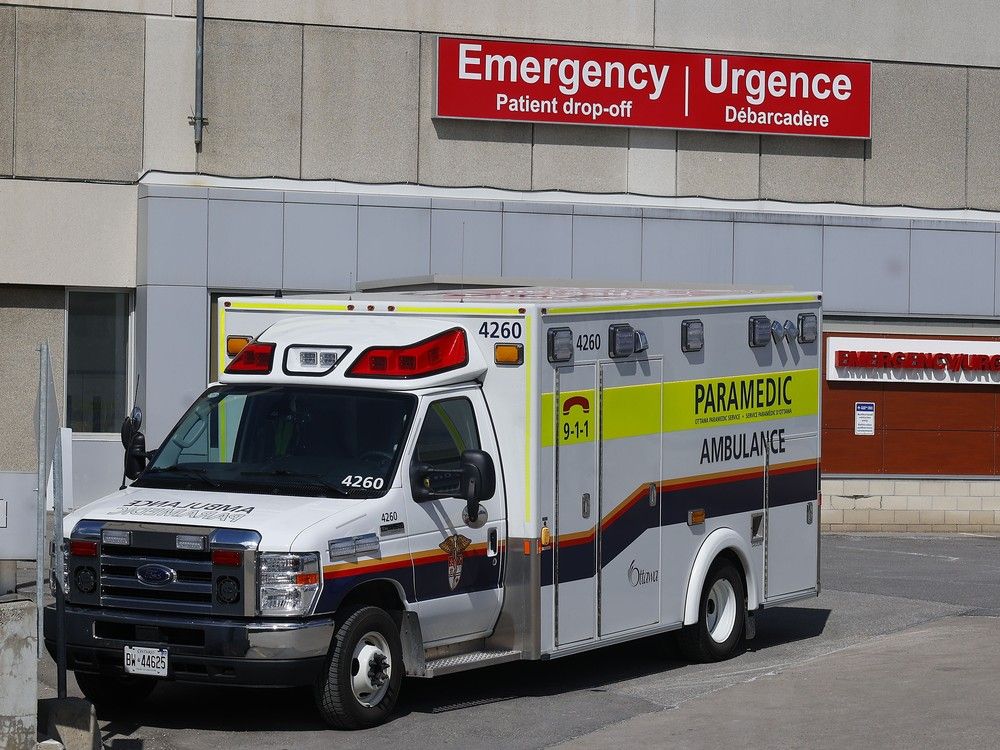Changes at both the Ottawa Paramedic Service and area hospitals have led to marked
improvements
in offload delays and “level zero” events at emergency rooms.
But challenges remain in overall performance, the service says in its 2024 annual report.
“The service adopted a new medical
priority dispatch system
in 2024 that can identify low acuity patients that may be deferred and high acuity patients who require an immediate response,” the report says.
Less severe patients may wait longer for paramedics to arrive. These patients are checked at 30-60 minute intervals in case the patient’s condition changes.
“Delaying the response for some patients is safe and clinically appropriate when retaining paramedics’ availability to respond to the next life-threatening incident,” the report says.
Paramedics responded to life-threatening calls within eight minutes 75 per cent of the time in 2024. That was up from 68 per cent of the time in 2023 and 61.8 per cent in 2022.
For urgent calls, paramedics responded within 10 minutes 76 per cent of the time, up from 68.8 per cent in 2023.
For sudden cardiac response calls, response time was six minutes 70.2 per cent of the time, up slightly from the target of six minutes, 65 per cent of the time.
The report says the new dispatch system and new mitigation measures in hospitals have resulted in a “significant decrease to hospital offload delays and level zero events.”
Level zero is when there are no paramedics available for calls.
Paramedics spent 11,373 minutes at “level zero’ in 2024, down from 52,995 minutes in 2023 and 73,060 minutes in 2022.
The Ottawa Paramedic Service said it evolved its service delivery in response to a growing population, an aging demographic, and reduced access to primary care.
Current healthcare challenges include the increase in mental health illnesses, the opiate crisis and related social issues.
“The role of a paramedic bridges the gap between health care and public safety.”
Staff say offload delays at local hospital emergency rooms continue to be a “significant contributor” to level zero events for the paramedic service.
“The performance target for level zero is that there should never be a time when a paramedic crew is not available,” the report says.
According to the paramedics, offload delays improved at all five Ottawa hospital emergency rooms last year.
Last September, hospitals implemented several mitigation strategies aimed at reducing offload delays and improving service for the patient.
The industry accepted performance target to transfer patients to the care of a hospital is 30 minutes at the 90th percentile. Here is a look at the Ottawa hospital offload times in 2024.
- CHEO had the lowest offload times, at 38.45 minutes (down from 39.46 minutes in 2023)
- Ottawa Hospital General Campus: 112.73 minutes (158.08 minutes in 2023)
- Ottawa Hospital Civic Campus: 112.78 minutes (142.20 minutes in 2023)
- Queensway-Carleton Hospital: 144.18 minutes (171.81 minutes in 2023)
- Montfort Hospital: 159.01 minutes (234.40 minutes in 2023)
Among new measures implemented by hospitals were a dedicated offload nurse program:
- Paramedics transfer care to a dedicated health professional within the hospital ER;
- “Vertical Patient ‘Fit 2 Sit’ Program,” which determines whether a patient is able to wait while seated in the emergency room. That program cleared almost 4,500 patients to wait in emergency, freeing paramedic crews to return to the community;
- And targeted diversion, where paramedics may transport a person experiencing homelessness to a specialized Ottawa Inner City Health clinic. In 2024, almost 900 people were diverted away from the ER.
The report is to be tabled June 23 at the city’s Emergency Preparedness and Protective Services Committee.
Related
- Ottawa’s new paramedic dispatch system launches
- Paramedics miss city council’s targets for responding to the most critically ill patients in 2023



